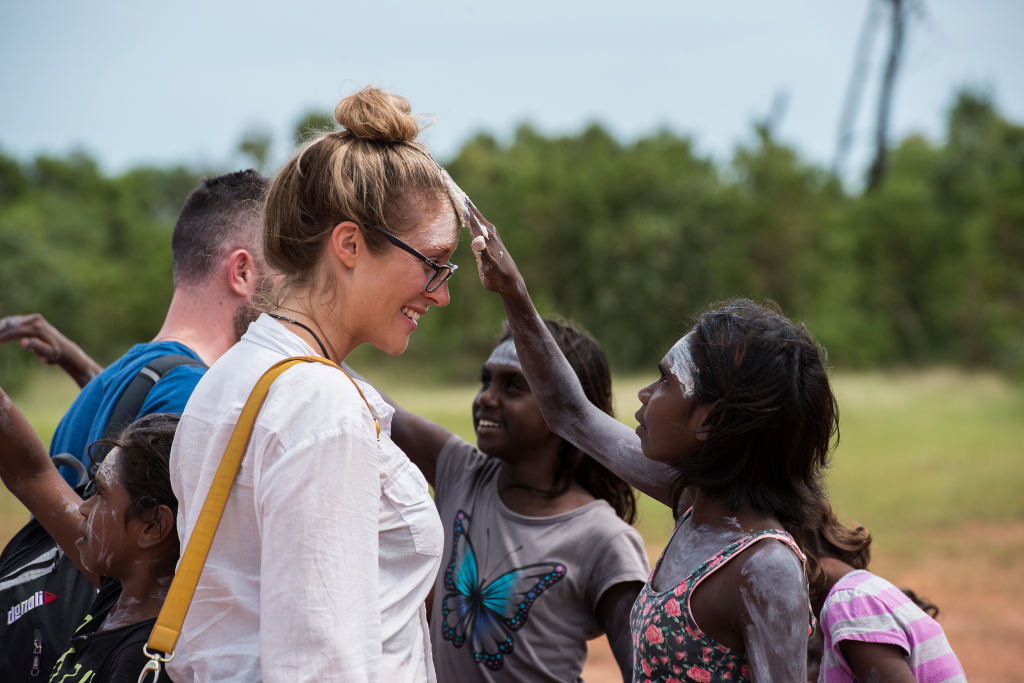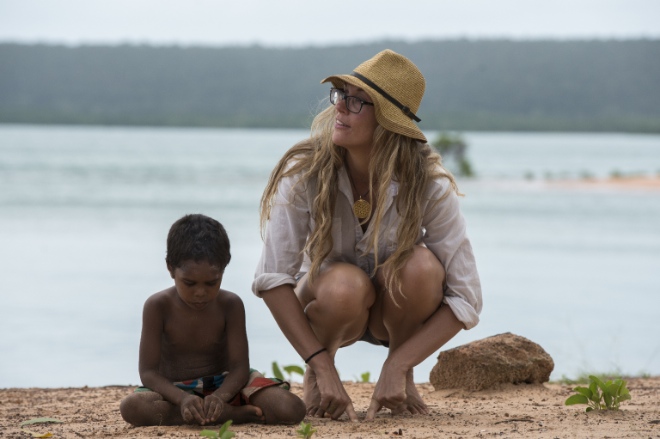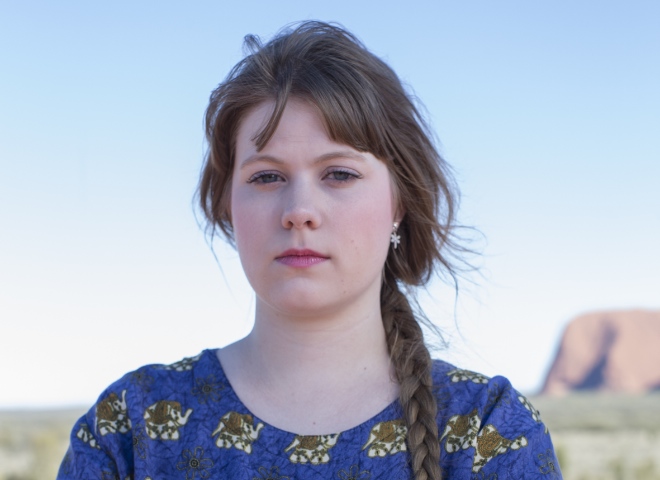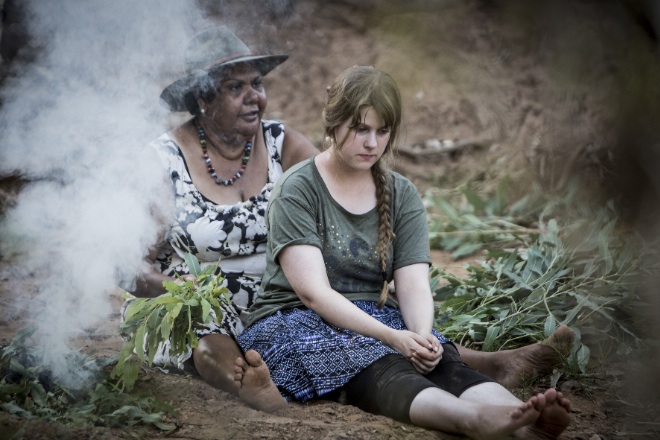First Contact Is One Of The Most Important Australian TV Shows Of The Year
Six in ten of us have had almost zero contact with Indigenous Australians. For six of us, that's about to change.

How much contact have you personally had with Indigenous Australians and Indigenous Australian culture? If you’re anything like six out of ten Australians – the majority of us – the answer is little to none.
This lack of contact between Indigenous and non-Indigenous Australia is not only a shame for non-Indigenous Australians, who know little about the world’s oldest continuous culture, but it also helps contribute to a pattern of cultural relationships that oppresses Indigenous people. That oppression, in turn, has real material effects on Indigenous people around Australia, who experience higher rates of infant mortality, illiteracy and innumeracy, unemployment, and have shorter life expectancies than their non-Indigenous peers – in addition to having to bear the brunt of the misconceptions and out-and-out racism fostered by this lack of cross-cultural communication. Clearly, if we are serious about closing the gap between Indigenous and non-Indigenous Australians, part of the solution is to familiarise non-Indigenous Australians with Indigenous people and Indigenous culture.
SBS’s new three-part reality series First Contact – which premieres at 8:30pm this evening on SBS ONE and NITV – takes six Australians who have had little to no prior contact with Indigenous culture or Indigenous people on a remarkable road trip around the country. The six participants are tested in extraordinary situations, and they find their beliefs about Indigenous people and culture radically reshaped as they come face-to-face with the beauty of Indigenous Australia, the tragedy of its post-1770 history, and the lived effects of Australia’s racial inequality in the present day. Hosted by Ray Martin and narrated by Hugo Weaving, the result is a television series that is both powerful and confronting.
We spoke to Darren Dale, producer of First Contact, and Bo-Dene, one of the show’s participants.
–
Darren Dale, producer
Junkee: What was the genesis of First Contact, and how did it develop from that point?
Darren Dale: It all started when we made First Australians, which was a historical documentary series, and some other films for SBS. But really the starting point was: how do you make something that will engage an audience about Indigenous issues? And how do we do something that will get a new audience, not just speak to the people we’ve spoken to before. So we did some research and we came across the fact that six out of ten Australians have had little to no contact with Indigenous people. And we thought, that’s such a simple idea, but a really great idea to test – to get six Australians who had little to no contact and take them to meet and see Aboriginal people, and immerse themselves in Aboriginal people’s lives.
The six participants represent a real diversity of opinions – it’s not just six people who are ignorant of Indigenous Australia, but people with loads of different preconceptions. You’ve got people, for example, who really fetishise and idealise Indigenous culture, which they can do precisely because they haven’t had prior contact.
DD: Having that diversity in the group – like having Bo-Dene, who’s 25 years old – was important, because that will also represent what people at home think. So the idea behind the show, really, is that you can identify with the participants – you can go, ‘Oh, I thought that!’ or ‘Don’t Aboriginal people get more welfare than we get?’ So what we wanted was that people could confront some of their own misguided stereotypes about Aboriginal people from the comfort of their own lounge room. And they can engage with those stereotypes. There are a lot of misconceptions about Aboriginal people, and lots of misinformation, too.
Having Alice on the show is interesting, too – she appears to be so progressive, so politically correct, and so on board with Indigenous identity. But the experiences she has on the road are actually quite confronting.
DD: The gap between Indigenous and non-Indigenous people is fuelled by many different things, isn’t it? It’s not just that people don’t know, or that people are ignorant, or that people have misinformation. Alice is someone at the other end of the spectrum, who has bookish knowledge: she knows about blackfellas, she identifies with them, but actually the reality on the ground is very different.
So I think with all those views – from having ignorance to feeling an affinity with Aboriginal people – there’s something for us to learn through having that human contact.
First Contact comes at a pretty interesting time, in terms the push for Indigenous recognition in the constitution, and less welcome news such as the number of Indigenous deaths in custody recently, in Western Australia. What do you think First Contact has to say to these current issues?
DD: There’s a conversation that needs to be had, and I think that conversation absolutely involves Aboriginal people as well. As a nation, we have an appetite to engage with Indigenous people – a friend of mine says that our nation has reached maturity and is entering its twenties, euphemistically speaking. It’s grown up, the terrible teens are now over, and we can start to engage with these pertinent issues.
In that conversation, there are lots of Aboriginal people looking for different ways to go forward. So I think it is a really interesting time for us as a country to address Indigenous issues, but a lot of that conversation is taking place amongst Indigenous people themselves: trying to take responsibility for issues that are in our community, and trying to move ahead with those.
Say you are one of those six out of ten Australians who have had little or no contact with Indigenous Australians – what kind of practical actions might you do to overcome that?
DD: I think, as Australians, it would great if we could get to the point where we see Indigenous culture as all Australian’s cultural inheritance. It isn’t just for Aboriginal people; we’re all Australians.
In New Zealand, for instance, lots of people know Māori language, lots of people know Māori culture. It would be great if we could see that Indigenous culture and Indigenous people are part of our nation’s rich cultural inheritance, as opposed to seeing it as just a black and a white culture.
–
Bo-Dene, participant
Junkee: Why did you sign up for First Contact, and how did you find out about it?
Bo-Dene: When I first saw the notice for the show, I wasn’t aware that it would involve Aboriginal Australia – it was just advertising a road trip. Then when I found out that it would involve going to Aboriginal communities, I thought, ‘Wow, this is an amazing opportunity’ – I’d never had the chance to do anything like that before.
It’s interesting that you saw it as an opportunity, because at the very start of the series there is some footage of you saying some relatively unkind things about Indigenous Australians, like “Aboriginal people saying that they’re disadvantaged compared to other people and that they need extra help is crap”. What was your thought process going from feeling that way, to deciding that you’d like to experience Indigenous Australia?
BD: I think that when I watch the series back I’m going to be a bit shocked at some of the things I said, because they were very ignorant views. I wouldn’t classify myself as a racist, it’s just that, growing up, I always had negative views about Aboriginal people. That annoyed me in the sense that I hadn’t had much interaction with them, so my views were pretty unfounded – shaped by people around me and the media, I guess. So I thought it would be a great opportunity to get some first-hand experience – living with Aboriginal people and learning about their traditions.
I have a lot of friends from overseas, and that made me realise that I just wasn’t happy with my view of Aboriginal people – I had a really negative view of them.
How do you think the trip changed those views?
BD: Living with so many different families taught me that Aboriginal people are very much like everybody else – I guess I was really thinking there would be a divide. It’s weird that there were so many things I could relate to with a lot of the people I met. There’s a lot of issues that Aboriginal people face that mainstream Australia wouldn’t understand, and you wouldn’t even begin to start the thought processes about why that’s happening unless you got the opportunity to have the amazing experience we did.
In Fitzroy Crossing, we met June [Oscar] and Emily [Carter] – they started an alcohol ban in that community, it was the first in Australia. I think meeting people like that, who are actually trying to change the bad cycles that are happening in Aboriginal communities, was amazing. Fitzroy Crossing really started to change my opinion of Aboriginal people from what I was thinking prior to the trip – it was amazing, and those ladies showed so much determination for the community.
What was the most difficult part of your First Contact experience?
BD: For me, the hardest part was when we went to Elcho Island. That was really upsetting, because I didn’t think that places like that could exist in Australia. I was born in Ipswich and then moved to Melbourne – I think I just always assumed that Australia was nice everywhere.
The first night we stayed in Elcho Island was so scary, it was the worst night of my life – the houses, the way it was so isolated from everything. It was so confronting to think that Aboriginal people can live in a community like that and no-one … well, personally, I’d never even heard of Elcho Island before the trip.
Now that you’ve done this trip, and had this life-changing experience, how do you personally plan to maintain that engagement with Indigenous Australia?
I would love to go back to the communities again to work, because I made some really good friends on the trip. Fitzroy Crossing was amazing with the work they’re doing there, and I hope some of the other communities we visited before that can take some advice from places like that, which are really starting to turn around. I’d love to help out in those communities again.
–
The first episode of First Contact screens tonight (Tuesday 18 November) at 8:30 on SBS ONE and NITV, and replays on SBS 2 at 9:30. Episodes two and three will screen on Wednesday 19 November and Thursday 20 November.
–
Chad Parkhill is a Melbourne-based writer and editor. He has written for The Australian, Kill Your Darlings, The Lifted Brow, Meanjin, The Quietus, and Spook. He tweets at @ChadParkhill.


